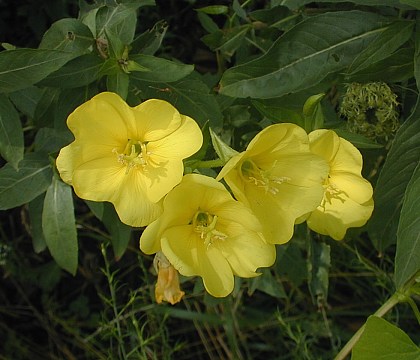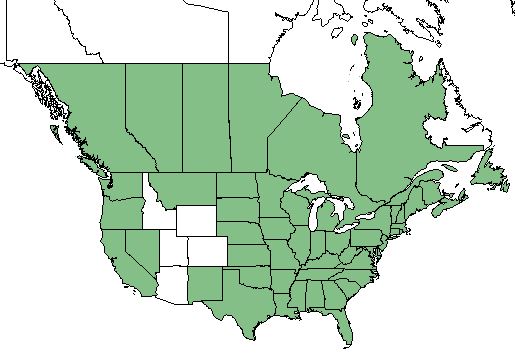Difference between revisions of "Oenothera biennis"
(→Taxonomic Notes) |
|||
| Line 35: | Line 35: | ||
===Phenology=== <!--Timing off flowering, fruiting, seed dispersal, and environmental triggers. Cite PanFlora website if appropriate: http://www.gilnelson.com/PanFlora/ --> | ===Phenology=== <!--Timing off flowering, fruiting, seed dispersal, and environmental triggers. Cite PanFlora website if appropriate: http://www.gilnelson.com/PanFlora/ --> | ||
| − | ''O. biennis'' | + | ''O. biennis'' has been observed flowering in February and August through October. <ref name= "PanFlora"> Nelson, G. PanFlora: Plant data for the eastern United States with emphasis on the Southeastern Coastal Plains, Florida, and the Florida Panhandle. www.gilnelson.com/PanFlora/ Accessed: 24 MAY 2018 </ref> |
<!--===Seed dispersal===--> | <!--===Seed dispersal===--> | ||
<!--===Seed bank and germination===--> | <!--===Seed bank and germination===--> | ||
| + | |||
===Fire ecology=== <!--Fire tolerance, fire dependence, adaptive fire responses--> | ===Fire ecology=== <!--Fire tolerance, fire dependence, adaptive fire responses--> | ||
''O. biennis'' is not fire resistant and has low fire tolerance. <ref name= "USDA Plant Database"/> | ''O. biennis'' is not fire resistant and has low fire tolerance. <ref name= "USDA Plant Database"/> | ||
Revision as of 11:18, 6 November 2018
Common name: common evening primrose [1]
| Oenothera biennis | |
|---|---|

| |
| Photo by John Hilty at IllinoisWildflowers.info | |
| Scientific classification | |
| Kingdom: | Plantae |
| Division: | Magnoliophyta - Flowering plants |
| Class: | Magnoliopsida - Dicots |
| Order: | Myrtales |
| Family: | Onagraceae |
| Genus: | Oenothera |
| Species: | O. biennis |
| Binomial name | |
| Oenothera biennis L. | |

| |
| Natural range of Oenothera biennis from USDA NRCS Plants Database. | |
Contents
Taxonomic Notes
Synonyms: O. biennis var. pycnocarpa (Atkinson & Bartlett) Wiegand; O. biennis ssp. caeciarum Munz; O. biennis ssp. centralis Munz
Varieties: none
Description
O. biennis is a biennial forb/herb of the Onagraceae family native to North America and Canada. [1]
Distribution
O. biennis is found in all of the United States and Canada excluding Idaho, Wyoming, Utah, Colorado, and Arizona. [1]
Ecology
Habitat
O. biennis proliferates in fields, pastures, roadsides, and disturbed areas. [2] Specimens have been collected from dry loamy sand, moist loamy sand, disturbed roadside, clearing on a trail, edge of old field, road embankment, border of wet pinewoods, open bank of marshes, old fields, along road in hardwood forest, and edge of parking area. [3]
Phenology
O. biennis has been observed flowering in February and August through October. [4]
Fire ecology
O. biennis is not fire resistant and has low fire tolerance. [1]
Conservation and Management
O. biennis is listed as a weedy or invasive plant by the University Press of Kentucky, the Nebraska Department of Agriculture Bureau of Plant Industry, and the Southern Weed Science Society. [1]
Cultivation and restoration
Photo Gallery
References and notes
- ↑ 1.0 1.1 1.2 1.3 1.4 USDA Plant Database https://plants.usda.gov/core/profile?symbol=OEBI
- ↑ Weakley, A. S. (2015). Flora of the Southern and Mid-Atlantic States. Chapel Hill, NC, University of North Carolina Herbarium.
- ↑ URL: http://herbarium.bio.fsu.edu. Last accessed: June 2018. Collectors: Loran C. Anderson, K. Craddock Burks, Gary Knight, R.K. Godfrey, Wilson Baker, Lisa Keppner, Ed Keppner, R.Komarek, Robert Lazor, Andre Clewell, Miguel Altieri, J.M. Kane. States and counties: Florida (Franklin, Nassau, Leon, Jefferson, Jackson, Madison, Wakulla, Liberty, Bay, Lee, Washington, Gulf.) Georgia (Grady, Thomas, Decatur)
- ↑ Nelson, G. PanFlora: Plant data for the eastern United States with emphasis on the Southeastern Coastal Plains, Florida, and the Florida Panhandle. www.gilnelson.com/PanFlora/ Accessed: 24 MAY 2018